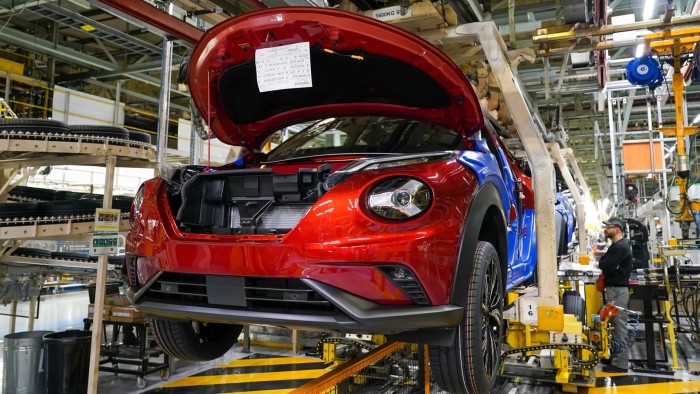Stay informed with free updates
Simply sign up to the Electric vehicles myFT Digest — delivered directly to your inbox.
The UK government has announced a consultation on its zero emission vehicle targets, following complaints from carmakers that the current regime could lead to job cuts as demand for electric vehicles stalls.
Transport secretary Heidi Alexander has given the automotive and charging industries eight weeks to submit their views on the existing EV targets including how existing “arrangements and flexibilities are working”.
The zero emission vehicle mandate was drawn up by the previous Conservative government at a time when EV sales were expected to take off.
Under the current targets, a certain percentage of each carmakers’ annual sales need to be zero emission vehicles, with the percentage rising from 22 per cent in 2024 to 80 per cent in 2030. Companies face fines for missing the target of £15,000 for each vehicle below the required level.
Electric vehicles accounted for 18 per cent of the UK car market between January and November this year — well below the 22 per cent threshold set by the mandate.
In November, Vauxhall owner Stellantis blamed EV rules for its plan to shut its van factory in Luton, putting about 1,100 jobs at risk.
Ford has also announced 800 jobs cuts in the UK because of slower-than-expected EV sales, while Nissan warned that jobs at its Sunderland plant, the largest in Britain, could be at risk unless the government relaxed its electric vehicle sales rules.
But the government has been clear that the headline 2030 figure will not be altered by the new consultation.
Alexander said: “Over the past few years, our automotive industry has been stifled by a lack of certainty and direction. This government will change that.”
The consultation will be split into two parts: the first will consider which hybrid cars can be included as sold alongside zero emission models between 2030 and 2035.
The FT previously reported that ministers were keen to allow carmakers to continue to sell Prius-style hybrid models — which use an engine and battery in parallel — in the UK until 2035. Unlike “plug-in hybrids”, which have larger batteries, “full hybrids” do not plug in to recharge. By contrast, the Tories are happy for petrol and diesel models to remain on sale.
The second part will consult on flexibilities within the 2030 target, with officials understood to be open to several changes within the rules, including expanding the “trading” loophole that allows carmakers to buy credits from rivals to avoid fines.
Another “borrowing” scheme under which manufacturers can miss early targets but avoid fines by pledging to overachieve in future years is also set to be extended by a few years from its planned expiry in 2026.
Speaking to the Financial Times, Nicola Walker, government affairs manager at Ford, said the company had called for a “moratorium” on fines in 2025 for companies who missed targets. However, this would involve changing primary legislation and is understood to be unlikely.
Business secretary Jonathan Reynolds said: “We are steadfast in our mission to help our world-leading automotive industry thrive, and this consultation will look at how we can support manufacturers, investors, and the wider industry to reach their targets.”
The changes have been met with consternation by the charging point industry, which has warned up to £6bn of investment up to 2030 could be at risk if rules are substantially watered down.
Vicky Read, CEO of ChargeUK, said she hoped that the consultation would bring “certainty” to the EV and charging sectors after a “destabilising few months, during which the foundations of the UK’s EV policy have been called into question”.
Read urged the government to “hold its nerve” and maintain ambitious EV targets.
Mike Hawes, chief executive of the Society of Motor Manufacturers and Traders, said: “The automotive industry welcomes government’s review of both the end of sale date for cars powered solely by petrol or diesel, and possible changes to the flexibilities around the zero emission vehicle mandate.”
He added: “It is imperative we get an urgent resolution, with a clear intent to adapt the regulation to support delivery, backed by bold incentives to stimulate demand.”


